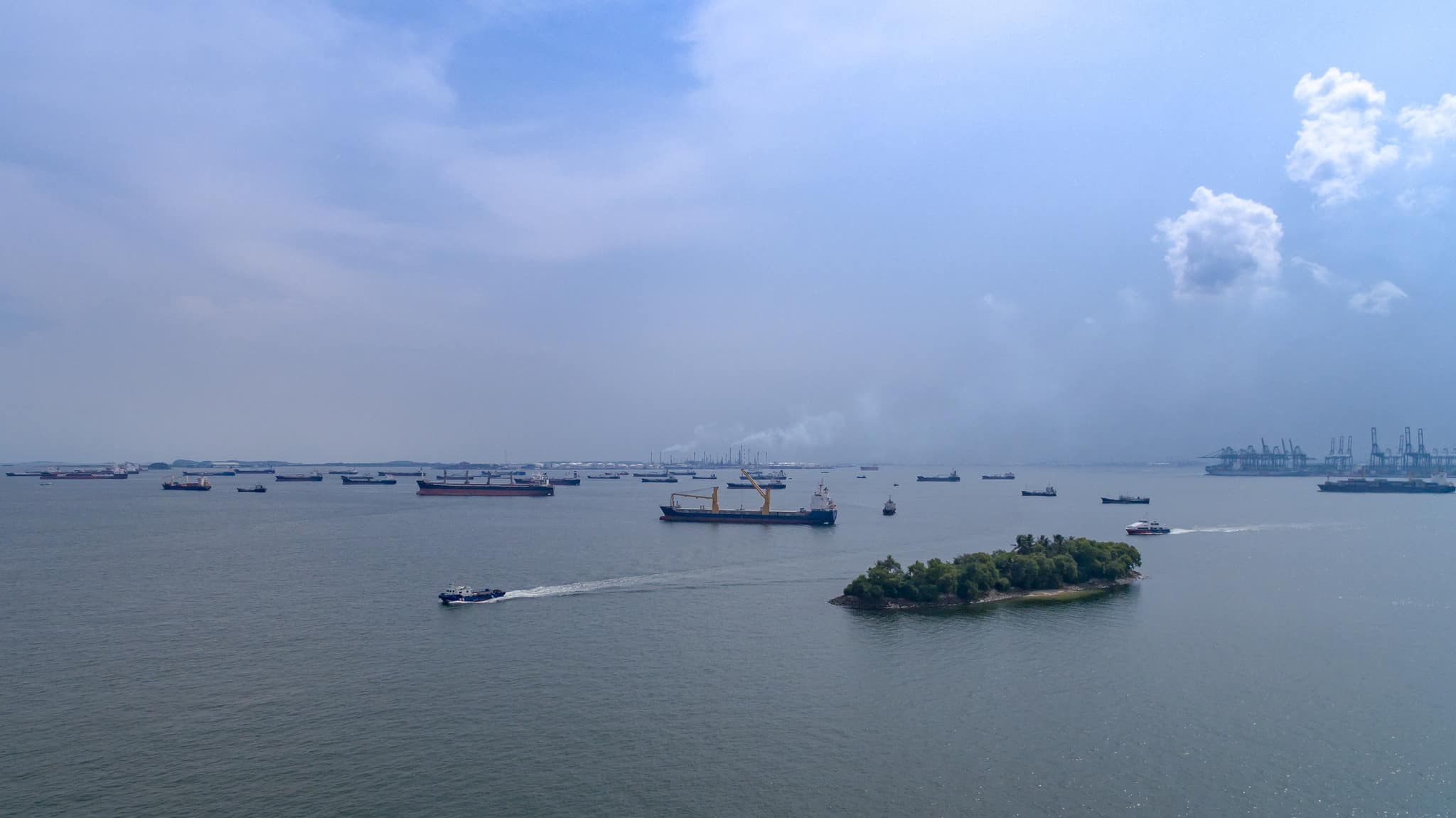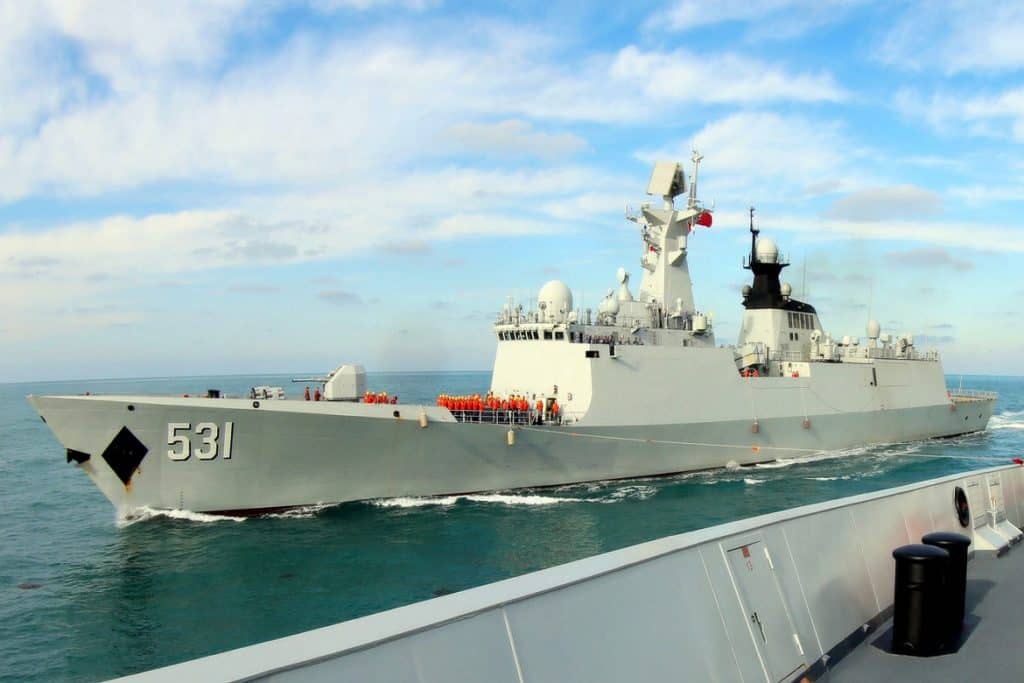China, Malaysia and Thailand armed forces conduct from Saturday, 20th October until 29th October a joint nine-day military drill in in the Strait of Malacca, off the coast of Port Dickson and Port Klang, in Malaysia.
In the drill, named ‘Peace and Friendship 2018’, China participates with three destroyers and frigates, two shipborne helicopters, three IL-76 transport aircraft and 692 servicemen. Bangkok with 53 troops and three senior Thai Royal Navy staff members. Malaysia has not yet announced the number of its troops and ships.
Though the Strait of Malacca is not in the South China Sea region, it is the chokepoint between the Southern Pacific Ocean and the Indian Ocean. The Chinese Ministry of National Defence said
The exercise aims to further demonstrate the common will of the armed forces of the three countries in maintaining peace and stability in the South China Sea region, strengthen practical exchanges and cooperation, and enhance their ability to jointly respond to various security threats.
China and Malaysia started ‘Peace and Friendship’ drill as a table-top exercise in 2014 and expanded to on-sea training involving troops from both nations the next year.
Why this trilateral armed drill is important
China claims a large part in the South China Sea region but other countries including Malaysia, the Philippines, Vietnam and Brunei also have their respective claims. Thus, the drill is seen as a way to improve its relations with the ASEAN countries.
 Many diplomats and military personnel believe that the trilateral drill between the three countries is a way to maintain peace and stability in the region and it should not be considered as a threat by any country. They also believe that though inclusion of Thailand took everyone by surprise, it was an expected move by China.
Many diplomats and military personnel believe that the trilateral drill between the three countries is a way to maintain peace and stability in the region and it should not be considered as a threat by any country. They also believe that though inclusion of Thailand took everyone by surprise, it was an expected move by China.
“Thailand’s inclusion is not surprising – China has been strengthening security ties with Thailand over the past few years including with new exercises, and that is seen as an even bigger win considering that Thailand is a U.S. treaty ally,” said Prashanth Parameswaran, a fellow with the Woodrow Wilson International Center for Scholars in Washington.
Last month an American warship and a Chinese one came close to colliding in the waters near the Spratly Islands. With China and America indulging in a long standoff against one another, China needs support from the ASEAN countries to maintain and even grow its dominance further west. It is also important for China to have good relations with ASEAN countries so that it can push its Belt and Road initiative further.
Also, with the increasing rivalry between China and America, it is way for Thailand and Malaysia to show their loyalties towards their Asian counterpart. “For Malaysia and Thailand, it’s a way of showcasing confidence-building with China and also signals that they aren’t choosing sides in the Great Power rivalries in the South China Sea,” said Collin Koh, a maritime security specialist at Singapore’s Nanyang Technological University.
Indonesia reacts
Indonesia’s Sumatra Island shares its borders with the Strait of Malacca. Indonesia says its aware of the drill exercise which is to take place from 20th October. “This is something countries regularly do in their waters,” said foreign ministry spokesman Arrmanatha Nasir. “We will continue to monitor.” He also said
It is also significant that the exercise is being held off the Straits of Malacca, which is an important choke point on sea lanes from the Indian Ocean leading to the Pacific Ocean.
Indonesia and India – China largest rival in India – have good bilateral relations and have announced plans to establish a strategic naval port at the mouth of the Malacca Strait.
Thailand-India-Singapore trilateral naval exercise
Thailand has shown its unwillingness to join the trilateral exercise with India which will be held along with Singapore. Thailand also said no to BIMSTEC military exercise. The sources claim that it was due to ‘budgetary concerns and not because of political reasons’, the sources claim that the unwillingness from Thailand for trilateral exercise is because of China. “Thailand would not like to upset the balance of powers between major countries in the region. Keeping in mind it’s close ties with Beijing, Thailand at the moment feels another trilateral exercise in the waters with India could be seen adversely” said a source.
Conclusion
The joint military drill of China, Malaysia and Thailand is hold around the same time of the visits of the U.S. Defence Secretary James Mattis in Vietnam and Singapore.
The drill will be held amid the increasing bitter competition between China and the United States, which has spilled over into a stand-off between the two countries’ navies in the disputed South China Sea.
With the sea region being the focus amid ongoing tension between China and America, it will be interesting to see where the ASEAN countries lay their loyalties. With Thailand and Malaysia already choosing their sides with the China, this might also hinder the relations between India and Malaysia and Thailand.
“China has been looking to cast its growing security links with Southeast Asian states as a demonstration of its commitment to regional stability, including in the South China Sea, even as it continues activities perceived to undermine that very stability,” said Prashanth Parameswaran.
With China’s complete focus right now is to ‘maintain stability and peace in the region’ and to improve the relations with the ASEAN countries. Only time will tell whether China drags Malaysia and Thailand, and the other ASEAN countries, in the ‘Chinese debt-trap’ or uplifts them and become the Great Power in Asia.
Image Credit: Flickr







